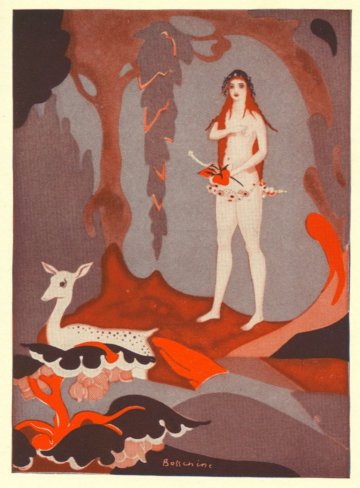Table of contents
(说教/教会诗,拉丁语/罗马语,公元1年,2330行)
简介
简介 | 回到页首 |
"Ars Amatoria" ( "爱的艺术" )是罗马抒情诗人在三本书中的57首说教诗(或许更准确地说,是对说教诗的滑稽讽刺)的集合。 奥维德 这首诗提供了在罗马如何和在哪里找到女人(和丈夫)、如何勾引她们以及如何防止别人抢走她们等方面的教导。
简介 | 回到页首 |
对这三本书的一个非常简短的总体总结 "Ars Amatoria" 可列举如下:
第一册:
 第一部分:他的任务。
第一部分:他的任务。
第二部分:如何找到她。
第三部分:在你外出散步时进行搜索。
See_also: 海马神话:传说中的仁慈的海兽第四部分:在剧院。
第五部分:在赛马场或马戏团。
See_also: 米南德 - 古希腊 - 古典文学第六部分:凯旋也是好事。
第七部分:在餐桌上。
第八部分:在海边。
第九部分:如何赢得她。
第十部分:首先保证女仆的安全。
第十一部分:不要忘记她的生日。
第十二部分:写作并作出承诺。
第十三部分:无论她在哪里,都是如此。
第十四部分:看起来很体面。
第十五部分:晚餐时要大胆。
第十六部分:承诺和欺骗。
第十七部分:泪水、亲吻和带头。
第十八部分:脸色苍白,对朋友要有戒心。
第十九部分:要有灵活性。
第二册:
第一部分:他的任务。
第二部分:你需要心灵的礼物。
第三部分:要温柔,脾气好。
第四部分:要有耐心并遵守。
第五部分:不要畏首畏尾。
第六部分:赢得仆人的支持。
第七部分:给她有品位的小礼物。
第八部分:宠爱她,赞美她。
第九部分:在疾病中安慰她。
第十部分:让她想念你(但不要太长时间)。
第十一部分:有其他朋友(但要小心)。
第十二部分:关于催情剂的使用。
第十三部分:激起她的嫉妒心。
第十四部分:要有智慧,要吃苦。
第十五部分:尊重她的自由。
第十六部分:保守秘密。
第十七部分:不要提她的缺点。
第十八部分:永远不要问她的年龄。
第十九部分:不要着急。
第二十部分:任务完成了(目前来说......)。
第三册:
 第一部分:现在是教女孩的时候了。
第一部分:现在是教女孩的时候了。
第二部分:注意你的外观。
第三部分:发型和服饰的品味和优雅。
第四部分:化妆,但要私下进行。
第五部分:掩盖你的缺陷。
第六部分:在笑声和动作上要谦虚。
第七部分:学习音乐,阅读诗人。
第八部分:学习舞蹈和游戏。
第九部分:在周围看到。
第十部分:谨防虚假的爱人。
第十一部分:谨慎对待信件。
第十二部分:避免恶习,青睐诗人。
第十三部分:尝试年轻和年长的恋人。
第十四部分:利用妒忌和恐惧。
第十五部分:玩斗篷和匕首。
第十六部分:让他相信自己被爱。
第十七部分:注意你的饮食方式。
第十八部分:于是到了床....
分析报告 | 回到页首 |
的前两本书 奥维德 's "Ars Amatoria" 这部作品获得了巨大的成功,以至于诗人写了一部同样受欢迎的续集、 "Remedia Amoris" ( "爱的补救措施" ),不久之后,它提供了关于如何避免被爱的感觉伤害以及如何失恋的委婉建议和策略。
 然而,它并没有得到普遍的赞誉,据说有些听众在早期的阅读中厌恶地走了出来。 "Ars Amatoria" 其对婚外性行为的赞美,在很大程度上要对以下情况负责 奥维德 他在公元8年被奥古斯都皇帝放逐出罗马,奥古斯都皇帝当时正试图提倡一种更严格的道德。 然而,更有可能的是 奥维德 然而,有可能的是,奥古斯都被卷入了与继承和/或其他丑闻有关的派系政治中(奥古斯都的养子波斯图姆斯-阿格里帕和他的孙女朱莉娅都在同一时间被放逐)。 "Ars Amatoria" 很可能被用来作为降级的官方借口。
然而,它并没有得到普遍的赞誉,据说有些听众在早期的阅读中厌恶地走了出来。 "Ars Amatoria" 其对婚外性行为的赞美,在很大程度上要对以下情况负责 奥维德 他在公元8年被奥古斯都皇帝放逐出罗马,奥古斯都皇帝当时正试图提倡一种更严格的道德。 然而,更有可能的是 奥维德 然而,有可能的是,奥古斯都被卷入了与继承和/或其他丑闻有关的派系政治中(奥古斯都的养子波斯图姆斯-阿格里帕和他的孙女朱莉娅都在同一时间被放逐)。 "Ars Amatoria" 很可能被用来作为降级的官方借口。
虽然该作品一般不提供任何立即可用的实用建议,而是采用隐晦的典故,并以城市对话的范围和智慧来处理这一主题,但诗歌的表面光辉还是令人眼花缭乱。 该主题的标准情况和陈词滥调被以高度娱乐化的方式处理,并以丰富多彩的细节来调剂。希腊神话、罗马人的日常生活和一般人类经验。
虽然通过他所有的讽刺性论述,但是、 奥维德 在这本书中,我们避免了直接的嘲讽或猥亵,性问题本身只在每本书的结尾处以简略的形式处理,尽管即使在这里 奥维德 例如,第二本书的结尾论述了同时达到高潮的乐趣,第三部分的结尾讨论了各种性爱姿势,尽管是以一种相当轻率和幽默的方式。
这首诗采用了爱情诗中的挽歌式对联,而不是通常与说教诗相关的双音节六联。 挽歌式对联由双音节六联和双音节五联交替组成:两个双音节后是一个长音节,一个尾音,然后再两个双音节后是一个长音节。
这部作品的文学性和通俗性确保了它一直是一个被广泛阅读的灵感来源,并在11和12世纪被列入欧洲中世纪学校的教学大纲。 然而,它后来也成为了道德谴责的受害者:所有的 奥维德 的作品于1497年在意大利佛罗伦萨被萨沃纳罗拉烧毁;克里斯托弗-马洛翻译的 "Ars Amatoria" 在1599年被禁止;而另一个英文译本直到1930年才被美国海关扣押。
资源 | 回到页首 |
- 英译本(珀尔修斯项目)://www.perseus.tufts.edu/hopper/text.jsp?doc=Perseus:text:1999.02.0069:text=Ars:book=1
- 带有逐字翻译的拉丁文版本(珀尔修斯项目)://www.perseus.tufts.edu/hopper/text?doc=Perseus:text:1999.02.0068:text=Ars



